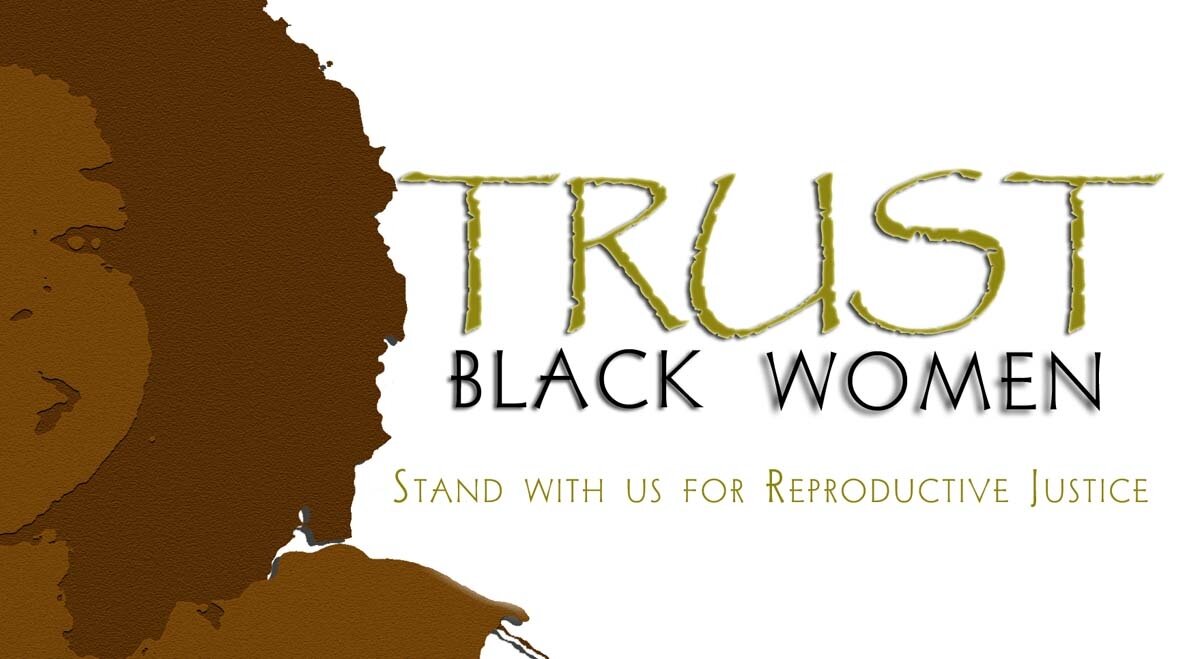Our History
SisterSong ...
created the national Trust Black Women partnership in 2010, when racist and sexist anti-abortion billboards actually accused black women of genocide for obtaining abortions – as if the oppression of black people should relegate black women to breeding machines with no right to make personal choices about family creation. SisterSong responded by convening a partnership of black-women-led organizations to form Trust Black Women, and in our first year, we defeated both the billboards and a concomitant bill to restrict abortion.
Today, SisterSong is building the national Trust Black Women partnership to be even bigger and bolder. Black-women-led organization members and individual black women members across the US are working together to transform how the country views and treats black women. We are using powerful communications and events to eradicate stereotype and uplift black women’s voices. We are training black women to be media spokespeople, and mobilizing black women and allies in national organizing for black women’s rights. We are connecting black women with holistic self-care techniques and resources, and building grassroots community. Joining forces with the Movement for Black Lives, we are spotlighting and addressing all of the intersecting oppressions in black women’s lives, and showing the country that we will be heard, that Black Lives Matter, and that it is past time for the US to honor and Trust Black Women to lead our own free lives.
On February 5, 2010, 65 billboards were quickly erected in predominantly African American neighborhoods in Atlanta with a sorrowful picture of a black male child proclaiming, “Black Children are an Endangered Species.” Georgia Right to Life and the newly-formed Radiance Foundation spent a mere $20,000 to sponsor the billboards that included the address of a previously unknown anti-abortion website. The billboards themselves were owned by CBS -- the same CBS that ran the anti-abortion ad during the 2010 Super Bowl – sponsored by Focus on the Family, featuring football star Tim Tebow. Interestingly, CBS previously refused pro-choice advertisements on their billboards in Atlanta sponsored by the Feminist Women’s Health Center, claiming that advertising abortion services was “too controversial.”
These stunning billboards attempted to use the history of medical mistrust in the African American community to accuse abortion providers of racism and genocide in a bizarre conspiracy theory. Not so coincidentally, they launched a misogynistic attack to shame-and-blame black women who choose abortion, alleging that we endanger the future of our children. After all, many people in our community already believe that black men are an endangered species because of white supremacy. They used a social responsibility frame to claim that black women have a racial obligation to have more babies – especially black male babies -- despite our individual circumstances. This social responsibility frame challenged the individualistic, privacy-focused frame of the pro-choice movement. At SisterSong, we speculated they chose to use an intersectional approach in this new attack campaign because our transformative reproductive justice framework – that intersects race and reproductive politics within a human rights context – is effectively forcing our opponents to shift tactics to try to racially segment our movements.
From the beginning, it was obvious to SisterSong we needed to immediately respond to this unexpected campaign and legislation. The first billboards were located only minutes up the street from our national headquarters. Even before they appeared, national media like the New York Times contacted us for interviews, because our opponents sent out advance press alerts announcing the campaign.
Our response was even more vital because of critical vulnerabilities we analyzed from our perspectives as women of color, including: 1) The overt religious appeals and the distortions of black history in the campaign would make work on reproductive justice in the African American community even more difficult; 2) They used visible black leaders in the campaign to describe themselves as protecting women and children, and falsely claim they were saving our community from the “abortion industry”; and 3) The pro-choice movement has not historically responded adequately to charges of racism and genocide, visibly flinching when race and abortion are linked in narratives about ulterior motives. These accusations can sound credible given our collective inability to thoroughly confront issues of race and power in the pro-choice movement. Women of color generally, and African American women, in particular, had to take these folks on.
SisterSong could not afford to be silent. SisterSong surged into action in response to SB 529. We had to be active on two fronts: to challenge the massive marketing campaign of the billboards, and mobilize to defeat the concomitant legislation. While we did not anticipate this unexpected development in our own backyard, we also assessed that we were providentially positioned to challenge this new front in the abortion wars. We only had from February until late April to defeat the legislation. The Georgia Legislative session lasts only three and a half months, or more specifically, only 40 days.
We had to make decisions quickly and we had to get them right.
Despite these challenges, we knew we had to respond quickly. We started by organizing a coalition of Atlanta-based organizations to expand our capacity and bring partners together who could rapidly work to develop our strategy and tactics. In addition to SisterSong, the coalition included:
SPARK Reproductive Justice NOW!
Feminist Women’s Health Center (Atlanta)
Planned Parenthood of the Southeast Region
SisterLove, Inc. (a women’s HIV/AIDS organization)
Raksha (an Asian-American women’s domestic violence organization)





